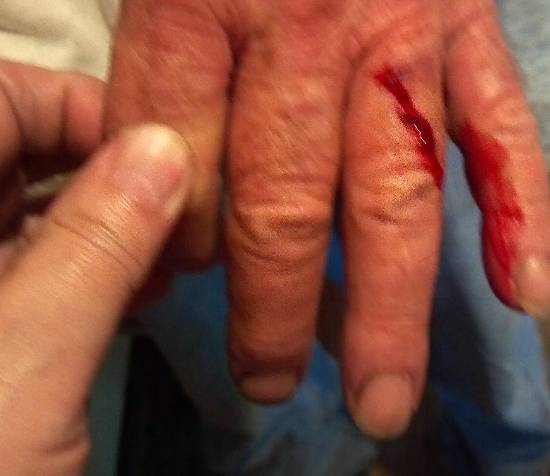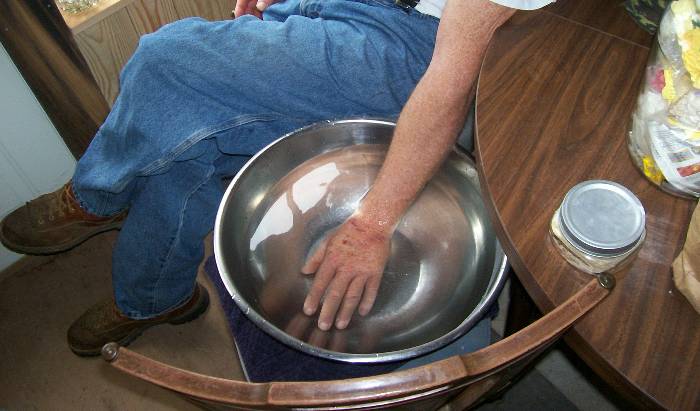Treating minor wounds and injuries at home

Minor injuries can be safely treated at home.
We get a lot of scrapes, bruises, burns, sprains, insect bites, and minor injuries here on the farm. Most of our injuries can be treated at home with natural remedies. Of course, we try to stay up to date on tetanus shots. That is a must when working with soil, compost, and livestock!
Everyone is different.
Tony has thinner skin than I do, and he bleeds freely when cut. He washes with soap and water, lets his wounds air dry, then covers the area with a dry band-aid. He probably dabs at the blood for 5 or 10 minutes before bleeding stops.
I scab over quickly with very little blood. I wash, but don't usually need a bandage. I also like to put a dab of lavender essential oil on my cuts and scrapes. Tony doesn't put anything on his.
*A note about essential oils - most essential oils must be diluted before applying to the skin. Lavender is one of the few essential oils that can be applied without diluting. Also, do not apply any essential oils to fresh burns or puncture wounds! Lavender essential oil can be safely applied to insect bites, scrapes, and shallow cuts. Use Aloe Vera for minor burns.

Soaking in salt water and keeping things clean
Soaking in salt water helps pull out germs from a wound. We put about a quarter cup of table salt to every quart of water. The water should be warm, but not hot, and should taste salty.
Real life case - treating puncture wound at home
When Tony was spurred by a rooster, I tried to get him to go to the emergency room. He refused, but did go to the county health department for a tetanus shot booster.
The spur went completely through Tony's hand. We soaked it in salt water several times the first day. After that, he kept it bandaged and clean. Keeping it clean is important!
Within three days, Tony was healing with no sign of swelling or infection. His hand remained sore for weeks, but he could do all of his usual chores.
I do not recommend that you treat a deep puncture wound at home! Tony is an old hillbilly that has only been to a doctor two times in his life. He refused to go!
Also, Tony has an excellent immunity due to a life of farming. When you are near the earth, working with soil and lifestock, you develop a resistance to harmful bacteria!
When the weather is bad, Tony's hand still bothers him. I suppose there was some damage to one of the ligamnets or muscles in his hand. I will catch him rubbing it before a storm and in cold weather. A doctor might have done something to prevent this, so get professional help if you get a deep wound.
Natural remedies in emergency situations
Do you have friends that won't go to a doctor? Do you like to hike in the wilderness or travel to remote destinations? Are you short on cash without medical insurance? If so, herbs are your friend.
There are several herbs everyone should know how to identify in the wild.
- Yarrow - yarrow stops bleeding upon contact. It has been used for centuries to stop bleeding on the battlefield during war time.
- Plantain - plantain stops the pain from insect bites and bee stings.
- Rose hips - rose hips contain enough vitamin C to keep you healthy in times of extreme emergency or famine, plus they can be found in the winter months when berries and fruits are not available.
- Yellowroot - yellowroot is a natural antibiotic, especially suited for treating urinary and bladder infections.
- White willow - white willow can be made into a tea that relieves pain like aspirin but without burning the stomach.
- Mullein - mullein is one of the best herbs for congested lungs. It can be made into tea or smoked in a pipe.
- Jewelweed - jewelweed is useful in the prevention of poison oak and ivy rash. Find some and rub it on all exposed areas to protect and heal the skin. Jewelweed can often be found growing near a poison oak patch!
Try to keep inflammation and infection from occurring. Drink lots of herbal teas that support the immunity, keep the wound clean, and cover it when outdoors, in dusty areas, and in crowds.
Do not let pets lick your wounds! Keep pet hair and dander away from all injuries, although loving on an animal can speed healing!
When a wound becomes inflamed or infected
If redness or pus develops, or if you are feverish, seek professional help.
What to do if no professional help is availabe:
Here are some things to try.
- Use a yellowroot wash to cleanse the area. Yellowroot is a natural antibiotic so drink a cup of tea, too.
- Drink echinacea or astragalus tea to build immunity.
- Use a sterile green-clay pack to draw out infection.
- Apply frankincense or calendula ointment to help heal and protect the wound.
Do not use comfrey salve on an infected sore! Comfrey heals a wound from the outside, trapping pus and germs inside. Infected wounds and sores need to drain!
I thank God for providing us with every green herb that we need to stay healthy and happy.
Read more about medicinal herbs.
Blessings to you and yours!
Thanks so much for reading my blog. Jan.

*Note - the information on this website has not been evaluated by the Food and Drug Administration.
© 2005-2024 website design and content by Janice Boling